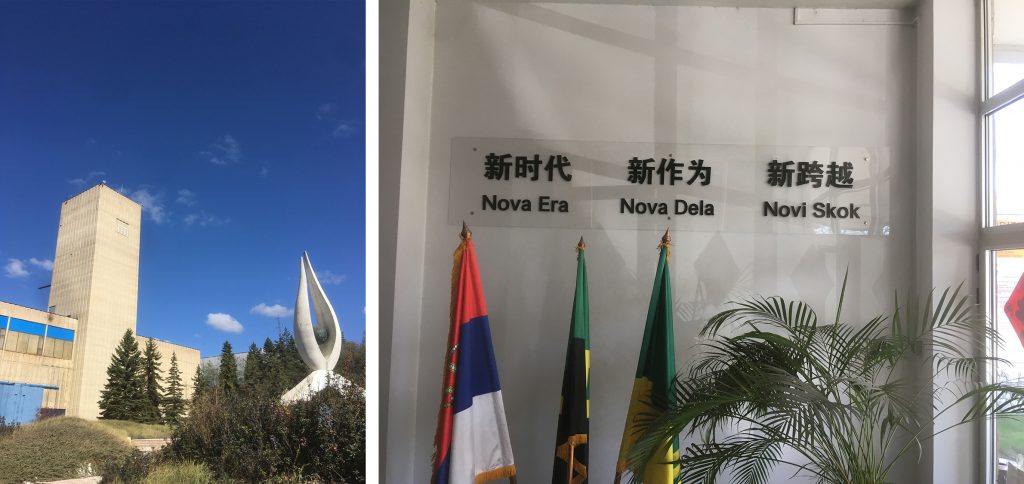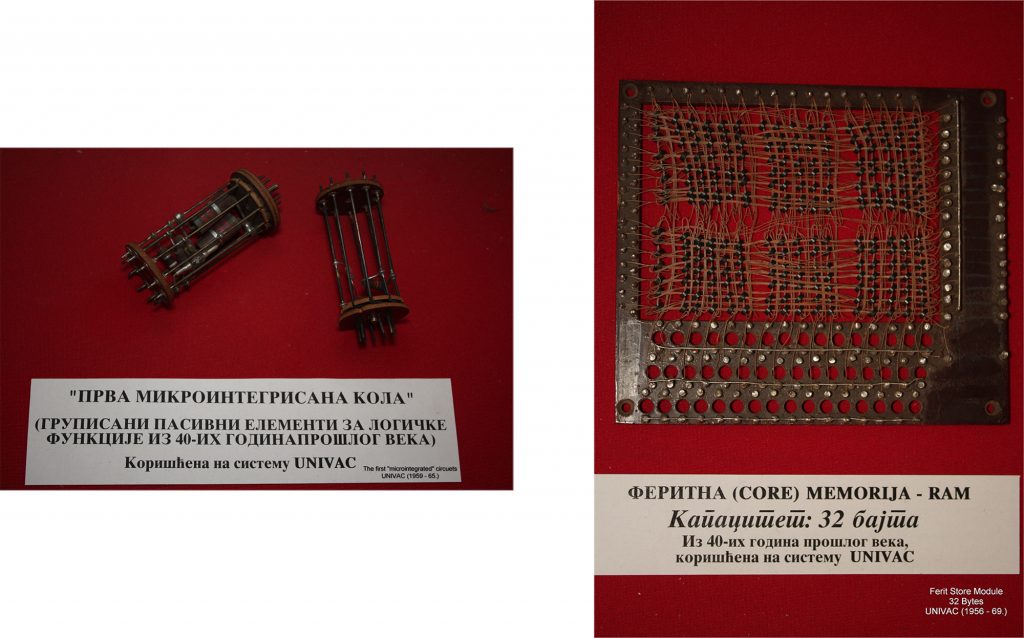“Bor is burning”1The phrase is a reference to the Serbian alternative rock band, Goribor (literally translates to: Burning Bor) originating from the town of Bor. The band got its name based on the impression of a large fire over the town due to the process of copper smelting slag being separated from copper.: the political economy of IT in the Socialist Republic of Yugoslavia
December, 2020
—
robert bobnič and kaja kraner

Back to the future!
At the entrance to the Bor copper mining complex (RTB Bor) where one of the pits is situated, a large board reads, “Politics of security and protection of the environment: life first, we have to care for our environment.” The signage is in Chinese and Serbian (though not its Cyrillic script). Nearby lies a monument to the victims of a labor camp in the Bor mine during World War II. The Third Reich was one of many who had dug a mine at this location within the past 7, 000 years, and when the Kingdom of Yugoslavia capitulated in 1941, they took over the mine shortly after, establishing around twenty labor camps known for a special kind of torture. People had to work barefoot and naked – some were executed: hung with their heads towards the ground as if to be some kind of monument. It is very quiet – almost too quiet – for a mine. As we look at the empty halls (which in the socialist heyday would have been filled with workers dining and changing clothes), two young engineers – one of them emphasizing that nowadays more female engineers work at the mine – ironically say, “we are going back to the eighties.”
After the breakup of socialist Yugoslavia, during the isolation of Serbia (owing to the international sanctions during the 1990s) and their period of privatization, RTB Bor was sold to the Chinese state-owned Zinjin corporation in 2017. Bor mining facilities is now under the process of reconstruction and automation as a part of Chinese investment in the Balkan region. Is this the coming of another wave of modernization, another acceleration – another colonization – as suggested by the vague perception of a Chinese techno-capitalist entry (through the Balkans) into Europe? Discussing the question of Sinofuturism, Chinese philosopher of technology, Yuk Hui, claims it “runs in the opposite direction to moral cosmotechnical thinking – ultimately, it is only an acceleration of the European modern project.”2Yuk Hui, The Question Concerning Technology in China: An Essay in Cosmotechnics, Falmouth: Urbanomic, 2018, p. 297. It is therefore a project, which according to the moral attitude in the current age of ecological thinking, cares neither for life nor for the environment.

Monument of the victims of labor camp at the entrance in Bor mine (left). Zinjin headquarter in Bor (right).
One mine, 7, 000 years of cosmos
A penetrated surface – the hole in the earth. Mankind not only got to his feet and looked up to the sky where he was blinded by the sun, but also began to dig into the earth’s past to exploit it for his own (re)production and preservation . We could say that to enter the mine is to enter geological and cosmological deep time – [the] accumulated dead labor of the cosmic economy, accessible only by the technics of mining conducted by the living labor of humans, tools, science, and machines. The latter is quite clear in the case of RTB Bor, where copper and gold mining dates back to at least 5000 BC. Nowadays, we can only imagine the importance of mining in the formation of different cosmologies from surrounding cultures during the prehistoric and historic, or premodern and modern, periods.
During the modern era, the technics of mining not only became industrialized, but functioned as the basis for industrial technological development – mining, and nature in general, is a standing reserve for energetic and infrastructural potential. The latter holds true both for the heavily industrialized 19th century and heavily informationalized 21stcentury, where mining and data mining came to form a particular synthesis. Strictly speaking, mining could be understood as one of the most fundamental practices underpinning cosmotechnics.
The concept of cosmotechnics was coined by Yuk Hui as a departure from the epistemological, social, and material framework of the European project of modernization. The latter was based on the ontological difference between nature and culture by means of modern technological development and its corresponding way of technological thinking, in which technics is understood as a mediation tool between the order of nature and order of culture. In this regard, it is important to note that cosmotechnics (as a concept and methodology) emphasizes a cosmological understanding of technology, not an anthropological one. This fundamental change in conceptualization – the elimination of the basic human-centricity, characteristic of Western modernity – became possible when the whole world (nature and cosmos included) began to function as a giant computational machine. For this reason, Hui is not conducting a backdoor exit through some nontechnological return, but rather, suggests an exit through technics itself. In the middle of technological geneses – as is modern technology – lies an entire cosmos of the totality of nature and technics: a particular technological genesis as well as a particular cosmology, i.e., the way different cultures understand the universe and comprehend the order of things, be it in the form of myth, magic, or science. In the specific case of Europe, the entire cosmic totality of nature and technics includes understanding the technology which endowed particular nation states with their competitive advantage in the colonial and economic subjection of the rest of the world. These are indistinguishable from capitalist modes of production.
While developing the concept of cosmotechnics, Hui’s initial question asks why there was no technological development in China as it happened in the West, given that China had material conditions for such a development. In embarking on an answer, he suggests that the reason lies in the different cosmology of Chinese culture. It is devoid of the concept of technology as operated and understood in the West (beginning with the famous Greek techne, until its synthetic finalization at the start of the 20th Century with the end of metaphysics by cybernetics, as understood by philosopher Martin Heidegger). In this sense, China’s current technocapital power, and corresponding Sinofuturism, is therefore based on the appropriation and acceleration of the Western concept of technology after the Opium wars and late socialist modernization.
Cosmotechnics encapsulates diversity, however not in the form of cultural diversity (the idea of multiculturalism itself being the product of modernization and colonialism), but in the form of technological diversity. Thus, the question of locality is wedged open (again, not locality as a result of cultural identity, but locality as the product of technical means). However, Hui states: “Cosmotechnics is not simply about different ways of making things, for example, different techniques of knitting or dying,” it is above all, “the unification of the moral and the cosmic through technical activities. […] This cosmological specificity must be rethought beyond astral physics, beyond the conceptualization of the universe as a thermodynamic system; it also reopens the question of morality beyond ethical rules, which are added posteriorly as constraints to new technologies. Technical activities unify the moral order and the cosmic order; and by unification, I mean reciprocal processes which constantly enforce each other to acquire new meanings.”3Yuk Hui, Machine and Ecology, Angelaki 25:4, 2020, p. 54-66. This is one way to say that technology is not neutral – not only in the sense of its use but also its existence. Perhaps this also means that cosmotechnics functions more as a perspective and less as a concept, and for that reason cannot be transmitted from one place or history to another without alteration.

Prehistoric mining tools in Museum of mining and metallurgy Bor (left). Zinjin flag at the entrance to the mining hole (right).
Balkan, time and (deep) time again
This is where our initial question comes in: can we reconstruct a specific Balkan cosmotechnics? The formulation of this question emerged precisely from the specific case of RTB Bor and is of particular importance when considering at least two distinct elements: (1) the extreme duration of mining activities and natural resource exploitation ranging through many different cosmologies, cultures, politics, and economies; (2) the period of modernization, which unfolded during the existence of socialist Yugoslavia. The latter is the focus of the current stage of our research.
The modern history of mining in Bor started in the late 19th century, when a rich Serbian industrialist, Djordje Vajfert, was looking for gold. He [mostly] found copper, though some gold as well. French capital soon entered and the French Company of the Bor Mines, the Concession St. George, began mining in 1904. In Bor you can still see the old flamboyant French houses where French management lived. In comparison, workers were all living in wooden housing. But technological development and modernization in Bor came with the birth of socialist Yugoslavia. The mine was nationalized in 1945, and the industrial town was gradually built around it. Due to the importance of mining in modern industry and the resulting “cult of work”, Bor attained a special status within Yugoslav culture and its collective imagination. It is this status, and subsequent turbulence of the postsocialist period, that now leads it to face Chinese technological investment as the inscription of Bor in global technocapitalistic unification (which rejects cosmotechnical difference).
This is the starting point for opening an inquiry of whether we can speak of a specific Balkan socialist cosmotechnics, i.e., a specific local understanding of technology. The question is important because it transcends the entrapment of Balkan and socialist Yugoslavia tradition in the form of cultural curiosity (from being part of the globalized multicultural world in which socialism ceased to represent a threat to the Western capitalist – and from the start, a technocapitalist – project). Still, Balkans is the name of a specific cultural and political locality where mainly South Slavs have resided for centuries under distinct mythological traditions and religious cultures. Due to its geographical position (and resulting unique political and economic position), the Balkans has been of special importance for many imperialist powers. The region as a whole also holds the position of the Other to either/both the West or the East, and besides that, has always been “out[side] of the world”: free-floating in space, endowed with a nonhuman and noncivilized imaginary. After the period of political unification in the 19th century and the consequently established Kingdom of Yugoslavia in the early 20th century, the region fully integrated under the banner of [a] socialist project, which in case of Yugoslavia acquired a specific positionality between the Western and Eastern bloc – clear in the fact that they implemented a Western technoscientific (cosmotechnical) projection in a supposedly socialist way.
If we propose the idea in this way, we must differentiate the alleged unity of the European modern objective based on a specific unifying concept of technology. In other words: we must consider – and question – the difference between the capitalist and socialist objective of modernization. The key question is therefore: are there any differences in how socialist projects enacted an understanding of cosmos and nature through technical means? Since there exists an overlapping sphere of technological thinking between capitalist and socialist alternatives – materialized especially in the totalizing science of cybernetics, which functions as an epistemic unified cosmotechnics without a specific locality – we can also pose an additional question: did socialism enact specific cosmotechnics when it implemented technological and cybernetic thinking?
Since [the] Bor mine was one of the first industries in Yugoslavia where cybernetic thinking and computer technology had been installed (the earliest example of Yugoslav computational modernization), we can lay the basic methodological groundwork: contrasting Heidegger’s understanding of technology (which already totalizes the concept of technology on a philosophical level) with Marx’s understanding of technology. From this, and by referring to the implementation of computer technology and management automatization in the industry when examining the Bor mine, we can pose the following question: why did technological progress in the Socialist Republic of Yugoslavia slow down at some point?

Components from Univac computer, installed in Bor mine in late 1950s. Source: Visa Tasič, Principal Research Fellow of Mining and Metallurgy Institute Bor.
Why did technological progress in the Socialist Republic of Yugoslavia slow down at some point?
By posing this question, we are directly referring to the development of computer technology at RTB Bor as explained by one of our colleagues, a researcher and a former employee at the Institute of Mining and Metallurgy Bor, dr. Dragan R. Milivojević:
When I wrote the article “Half a Century of Computing in the Serbian Copper Mining and Metallurgy Industry”4The article “Half a Century of Computing in the Serbian Copper Mining and Metallurgy Industry” was published in co-authorship with Dragan R. Milivojević, Marijana Pavlov (Institute of Mining and Metallurgy Bor, Serbia), Vladimir Despotović (University of Belgrade, Serbia) and Visa Tasić (Institute of Mining and Metallurgy Bor, Serbia) in IEEE Annals of the History of Computering in 2012. for a very reputable American journal IEEE Annals of the History of Computering… and – when you write such an article, you send it and it is reviewed by the peer reviewers [who] demand you correct something, etc. – the thing they asked me the most was to explain where this interruption of our development occurred. They remembered us in the rank of Finland and Czechoslovakia, because from 1946 to 1950 those three countries – Yugoslavia, Finland and Czechoslovakia – were technologically at the same level. This is what they were most interested in, and of course I had to explain it a little bit, I had to find the literature on what was in those other countries, and I found out we really haven’t lagged behind at all.
We are suggesting that the answer to this question can present a good starting point to emphasize specific understandings of science and technology within the framework of Marxism – the official ideologic, economic and political basis of “real existing socialism”. In the first phase, Marx’s, or more broadly, Marxist understanding of technology (from which the socialist policies regarding technological development in Yugoslavia stemmed) must be differentiated from Heidegger’s (who is predominantly considered the key philosophical representative of the modern Western understanding of technology). The main difference emerges from the fact that Marxism perceives science and technology in its indistinguishable relation to the capitalist mode of production, marked with the broader move from the perception of natural resources as the main source of value towards human resources as the main source of value. Science and technology in Marxism are therefore not so much understood in its relation to nature, but in relation to human nature, whereby presupposing the context of (in Foucauldian terms) governmentality and biopolitics – characteristic of the (Western) modern period. The latter can be understood as a condition of the possibility for Marx’s labor theory of value; Marxist perception of science-technology relation; the linkage of scientific-technological development with the problem of alienation; and especially the ‘institutionalization’ of the split between the manual and intellectual labor – broadly speaking: class perspective on technological development.
The establishment of “human capital” (if we would use the classic neoliberal term) as a fundamental of Marxist understanding of technology and technology-nature relations, inevitably led to the (self)limitation of potentially exponential, technological socialist progress. Socialist technological “catching up” since the mid-20th century, driven by the logic of economic rationality, at some point clashed with the logic of the development of social relations. In the specific case of self-governing, socialist Yugoslavia, the latter can be especially seen in the formal equalization of IT experts with all other employees, which led to difficulties implementing critical technological innovation on a micro social level. Dragan R. Milivojević explains this as:
[…] It was a time of socialist self-management. That period was very interesting. I am not qualified to talk about it, but I can talk about my experience of that period because I’ve lived and worked in [it]: we had terrible difficulty putting an expert idea into practice because at [the] time it was ideologically necessary for all the working people to agree with that idea – all those employed in [the] particular organization. […] The complex organization of the joint work RTB Bor had 23,000 employees, in each relatively autonomous unit of RTB Bor, an assembly of working people had to happen – an assembly of all of the employees – and more than 50% of them [must] vote for this idea. The voice of the lady who [made] coffee and my voice were considered equal. It’s funny but it was a reality.5From the interview with Dragan R. Milivojević, retired researcher of Institute of Mining and Metallurgy Bor, Serbia conducted in Belgrade (Serbia) on 22th of October 2020.
The Socialist “monopole” of state politics/party over the economy, or more specifically, workers’ involvement in the management of factories and their development, in its first phase (at least in theory) tried to reduce established differentiation between intellectual and manual labor by including workers in the decision-making processes. In the case of RTB Bor, the latter can be explicitly perceived by (in all the big factories in Yugoslavia) the mandatory worker’s magazine which shared all crucial information regarding the company’s leadership; investments; its annual loses and profits, etc. The transparency of the factory’s management established this as a common matter, which effectively activated [the] worker’s sense of responsibility (worker’s self-management goes hand in hand with the production of their responsibility [i.e., moral training], which is specific to the socialization rather than individualization of responsibility), and presented that company or factory as a collective.

Worker’s magazine “Rudar” (“The Miner”). Source: Bor Library (Bor, Serbia).
Did socialism enact specific cosmotechnics when it implemented technological and cybernetic thinking? And could a Marxist understanding of scientific and technological development be the starting point to answer this question?
At current stage of our research, we cannot fully answer to the complexities these questions unravel, and in general we see our outlined inquiry as relatively modest: primarily questioning the unification of modern Western cosmotechnics. However, we can further emphasize the Marxist determination of scientific and technological progress in four main goals and its consequences (consequences that can be also seen in specific case of RTB Bor’s socialist period). Those goals are: (1) joint control, (2) rational regulation, (3) minimum power consumption, (4) conditions that are most worthy of human nature and are best suited to it (i.e. demand creative work).6Andrej Kirn, Marxovo razumevanje znanosti in tehnike (Marx’s understanding of science and technology), Ljubljana: Mladinska knjiga, 1978, p. 226. Technology itself is largely understood as a synonym for material production (and the opposite of a spiritual one), whereby the main idea is that a society’s material foundations (technical included) are closely related to social change.
Technological and scientific development and progress are therefore potential tools for social development and progress; they are seen as a moving force of history, rather than mere liberation of humankind from nature. The industrial revolution of the 19th century, which established the idea of nature as a form of energy in service to the needs of humankind, is defined as a condition for the possibility of a higher form of society, i.e. communist society based on the ideal of creative work (for instance, as manifested in arts). Technology in Marxism is therefore not so much understood within the framework of the Greek techne (an activity that does not satisfy in itself and is, above all, the means of developing other activities.7It is quite evident, Greek understanding of technics follows an already established class division of labor as the basis of antient Greek society: among others, the division between the free citizens and the enslaved ones executing manual labor. For instance, ars as an activity where human freedom is manifested and this freedom is understood as freedom from the natural laws of necessity, or human’s general susceptibility to nature – including his own). Marxist understanding of technics and technology is not strictly instrumental, objectivist (nature as a means of supply for humans), or idealist. Namely, at least in principle and programmatic terms, Marxism eliminated the differentiation between techne and physis. Technology is therefore a means of human expression, a channel where human activity comes within proximity to the autopoietic creativity of nature, characterized by the merging of techne, poiesis and physis. Since the concept of cosmotechnics encapsulates the nature-technics relation, in this regard we could add that in a socialist society, the ideal of nature’s productivity is established as the very basis for [a] communist society ideal. Naturally, this is all theory, though it does prompt us to think on (socialist) practice or – better yet – real, existing socialist technics?

Robert Bobnič is a Ph.D.
Kaja Kraner is an independent researcher, lecturer, and curator.
[1] The phrase is a reference to the Serbian alternative rock band, Goribor (literally translates to: Burning Bor) originating from the town of Bor. The band got its name based on the impression of a large fire over the town due to the process of copper smelting slag being separated from copper.
[2] Yuk Hui, The Question Concerning Technology in China: An Essay in Cosmotechnics, Falmouth: Urbanomic, 2018, p. 297.
[3] Yuk Hui, Machine and Ecology, Angelaki 25:4, 2020, p. 54-66.
[4] The article “Half a Century of Computing in the Serbian Copper Mining and Metallurgy Industry” was published in co-authorship with Dragan R. Milivojević, Marijana Pavlov (Institute of Mining and Metallurgy Bor, Serbia), Vladimir Despotović (University of Belgrade, Serbia) and Visa Tasić (Institute of Mining and Metallurgy Bor, Serbia) in IEEE Annals of the History of Computering in 2012.
[5] From the interview with Dragan R. Milivojević, retired researcher of Institute of Mining and Metallurgy Bor, Serbia conducted in Belgrade (Serbia) on 22th of October 2020.
[6] Andrej Kirn, Marxovo razumevanje znanosti in tehnike (Marx’s understanding of science and technology), Ljubljana: Mladinska knjiga, 1978, p. 226.
[7] It is quite evident, Greek understanding of technics follows an already established class division of labor as the basis of antient Greek society: among others, the division between the free citizens and the enslaved ones executing manual labor.
